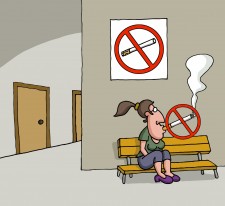
ban smoking via shutterstock
The Department of Housing and Urban Development is moving forward with regulations to ban cigarette smoking in public housing. If approved, implementation of the policy would begin by the start of 2018.
The American Council on Science and Health has been against smoking since our inception, so less smoking is obviously a good thing, but bans are fraught with complications. Unhealthy behavior ends when people realize it's the smart thing to do, not when they are forced to comply with laws on conduct in their own homes.
So the primary question is this: How far do personal rights extend when unhealthy behavior is involved?
"Your right to swing your arms ends just where the other man's nose begins," wrote Zechariah Chafee ("Freedom of Speech in Wartime," 32 Harvard Law Review 932, 957) in 1919. Smoking is a personal behavior that extends to other people, including children. We allow parents control over many other harmful behaviors that impact children, and the people most impacted by this kind of government control are least able to have the financial clout to fight this battle. So those two conflicting philosophical notions will set off advocates of freedom.
Some arguments are instead legal. The federal government is intervening in a regulatory realm that is typically reserved for state and local government, creating the first federal smoking ban in the United States.
There are other factors that might make the issue a little more obvious:
- It would save taxpayers money. A 2014 Centers for Disease Control and Prevention study estimated that prohibiting smoking in public housing would yield an annual cost savings of $153 million, including $94 million in secondhand smoke-related health care, $43 million in renovation of smoking-permitted units and $16 million in smoking-related fire losses, according to HUD. In an Obamacare world, people in public housing will be increasingly financed by the rest of the country.
- HUD is just following the lead of public-housing authorities. More than 228,000 public-housing units nationwide are already smoke-free facilities due to local ordinance, or their own initiative, so this would just raise the total of smoke-free units to almost 1.2 million.
- A smoking ban would protect vulnerable populations. Some 500,000 public-housing units are occupied by the elderly. More than 760,000 children live in public-housing projects. A smoking ban would protect them from secondhand smoke, as both the young and elderly are more susceptible to the negative effects of smoke inhalation.
There are valid arguments in opposition to HUD regulations:
- It s an unfunded mandate (for owners). Housing authorities are struggling to maintain buildings and keep the lights on, says Amy Glassman, a lawyer who represents groups who receive money from HUD. To add an additional regulatory requirement, regardless of intention, and to do so without adding any funding is burdensome.
- It s an unfunded directive (for tenants). The HUD rule doesn t come with any funding for outreach, education or cessation strategies to help residents quit smoking.
- Public-housing agencies are already enacting smoking bans so federal involvement is unnecessary. By HUD s own accounting, public-housing agencies responsible for one-fifth of the nation s public-housing stock have already voluntarily adopted smoking bans.
- Is stopping smoking really a public-housing agency priority? No one making policy has asked, but it is likely that if you ask public-housing agencies what they d like to accomplish from a federal HUD campaign, the answer would not be a smoking ban.
- How would the federal government implement the ban imposed upon these residents? Though HUD claims this only would be a nuisance law, this could lead to the eviction of low-income residents who continue to smoke. What happens if people won t quit?
A civilized society does what it can for all people, but the downside to making people more reliant on government is that it then gets to use its financial clout to control behavior. It could be a slippery slope to creating a society where the rich and poor are separated by rights, as much as income. The government can then claim it's taking action for their own good.


